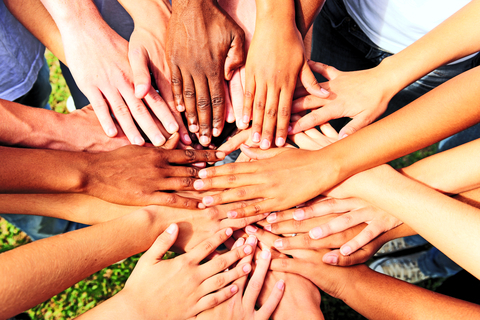To name a few: Hepatitis and Stroke Awareness Month, Mental Health Month, Teen Pregnancy Prevention, National Physical Education and Sport Week, National Bike to School Day and World Autoimmune Awareness Day. There are a total of 213 national health observances throughout the year.
Some might ask:
"Is of all this necessary?"
"Aren't 213 observances a bit of an overkill?"
"Why so many?"
We often hear these questions because the majority of people don't really understand the hardships, difficulties, and struggles of others; or if we do care, we're too busy or too financially strapped to do anything about it. People question, "Can we really be expected to spend our free time and resources on such a long list of special interest groups?" Some might say, "That's simply unrealistic. I don't have enough time, energy or money for that!"
And this is true. You don't, and neither do I.
Nobody has time to constantly be aware of other people's health struggles every day. And this is exactly the reason we need so many "awareness" months, weeks, and days.
The people represented by awareness organizations would be without representation, and without services and funding to work towards becoming healthier. They would lack preventive measures and treatment were it not for those who advocate for them. Without advocates, those who are suffering would be the "unknown and unseen" in our society. Living, basically, alone without help and suffering without hope.
Let's look at some groups who are typically represented by awareness observances:
- Babies, children, adolescents, the elderly
- People with mental health and addiction issues
- People who are homeless and poor as a result of natural disasters and war
- Those with unique diseases or in need of medical treatments that have yet to be developed
- People being abused or neglected
- Populations who are undernourished
- People who are victims of crime
- Veterans
- Folks who are locked away or shut off in their homes... those we never see, or we see as weird or crazy
- People who "don't know what they don't know, but if they knew, their lives would be better off"
We're talking about the disabled, underserved and disempowered. Those who have little or no voice and few resources.
We don't acknowledge this side of life, because for most of us, unless we're personally touched by some illness, struggle, or condition, we tend to turn away and pay little or no attention. We may see or hear about special populations periodically, but it generally goes in one ear and out the other, without giving it much thought. It's similar to what many people feel when seeing homeless person on the street, everyone has an opinion, but that's the extent of our interest and action.
So then, what can be done?
In an ideal world, each of us would have the kind of compassion and understanding that opens us up to the belief that everyone in our society deserves advocacy, support, and funding for the care they need. In an ideal world, each of us would get behind the idea that whatever malady someone experiences, that person, at a bare minimum, is due the respect it takes for them to be seen as deserving of services. In that ideal world, there would be a way for each of us to advocate for solutions, not just for problems of our own, but for the problems of people who have difficulties we cannot understand.
While we don't live in an ideal world, each of us can help work towards one.
National health observances can sharpen our awareness, making us a little more sensitive to people in need, which then motivates us into action. Maybe we contribute when we usually would not have. Maybe our conversations about the disadvantaged change. Maybe we shift our thinking. Maybe we volunteer when we wouldn't have before. Maybe we become more active by replying to social media posts. Maybe we increase our knowledge and understanding of the dangers of radon (National Radon Action Month), or learn about the trauma experienced by a family having a child with birth defects (National Birth Defects Awareness Month). Maybe we start to ask questions about heart disease (Heart Disease Awareness Month) or cancer (National Cancer Prevention Month). Perhaps, as we are offered the opportunity to observe, we begin to grasp the injustices of racial, ethnic and religious discrimination.
So the next time you think that public awareness of a special interest seems like too much, or you roll your eyes at another awareness month, think about what you are doing to perpetuate a situation that requires such advocacy. Then, be Independent Enough to make a change -- a shift -- in your own thinking and behavior when you see a person in a wheel chair, hear of some obscure disease, or when you become aware of the victims of a natural disaster.
It's up to you as an individual to decide how and what changes you are going to make. Whatever happens, don't let yourself become numb or cynical. Try to fight the urge to simply shrug your shoulders and walk the other way. You may be very surprised how a random act of kindness will not only help others, but yourself as well.
